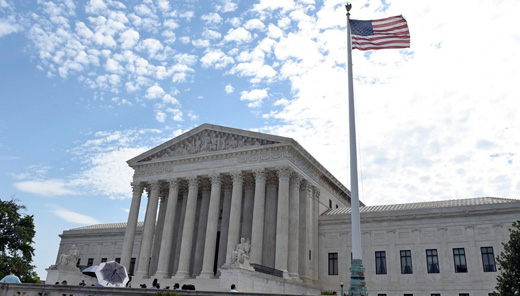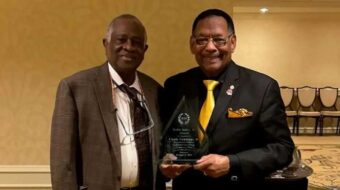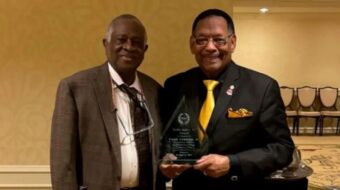
CHICAGO – Friedrichs v. California Teachers Association, in which the Supreme Court heard oral arguments today, is not about free speech. It’s the latest in a string of cases to use the First Amendment as a pretext to attack democracy and the political rights of trade unions.
Four decades ago, in Abood v. Detroit Public Schools, the Supreme Court held that since public sector union contracts cover non-members as well as members, unions can make non-members pay their share of contract costs in the form of “fair share” fees. The court has upheld this basic principle in the face of repeated challenges, most recently in Harris v. Quinn.
Now, a rabidly anti-labor lobbying group called the Center for Individual Rights is asking the Supreme Court to overturn Abood, claiming (as usual) that “agency shop” rules force workers to subsidize political activity with which they might disagree.
This time, the mascot is disgruntled teacher Rebecca Friedrichs. She’s not a union member, but she receives union pay and benefits under an agency shop agreement. She’s not unhappy enough about the system to switch to a non-union job- she just doesn’t think she should have to contribute to the costs of getting a contract.
The anti-labor Center for Individual Rights found Friedrichs and bankrolled a legal offensive to turn her griping into a landmark case on labor rights, fast-tracked to the Supreme Court.If the high court rules for Friedrichs and her corporate backers,the public sector nationwide will become right-to-work. Without the right to levy dues and fair share fees, our unions will collapse, along with the last substantial barrier to the privatization agenda of the one percent.
This case isn’t about the First Amendment rights of citizens, any more than Citizens United was. It’s about corporate power, and obstacles to it. It is an outright attack on unions for daring to get involved in politics. An amicus brief filed by the State of Michigan (and seven other states) makes clear what’s at stake:
“High labor costs in general… contributed to [Detroit’s] bankruptcy,” the brief claims. “And onerous work rules enshrined in bargaining agreements hampered the City’s efficient functioning, including… limitations on management rights that impaired the City’s ability to manage policies, goals, and the scope of operations for City departments.”
Collective bargaining, the brief alleges, is the major obstacle to implementing “policies” and “goals” to promote “efficient functioning.”
To see what that “efficiency” agenda looks like, we only have to turn from Detroit to Flint, where an unelected emergency manager switched the city’s water supply. To cut costs, polluted water from the Flint river was run through old lead pipes into citizens’ homes. The result? Water with ten times the amount of lead necessary to cause neurological impairments in children.
Or we could turn westward to Chicago, which Mayor Rahm Emanuel runs as a private playground for the one percent. After the 2013 closure of 50 elementary schools in African-American and Latino neighborhoods, Rahm’s handpicked Board of Education is now threatening to lay off 5,000 teachers unless we accept a two-tier pay system that locks new teachers into poverty by eliminating pay increases for seniority and educational advancement. All so the mayor’s hedge fund friends don’t have to worry about a financial transaction tax.
These are the “goals” and “policies” that the anti-labor crowd has in mind: Michigan’s totalitarian “emergency manager” law. Chicago’s ugly culture of officially sanctioned violence and pay-to-play politics.The silencing of unions that dare to speak out on political issues. Unbridled privatization, dismantling of democratic institutions, and corporate control of government at every level.
Public-sector unions are one of the last organizations with the fighting strength to challenge this cruel and deeply undemocratic form of governance. That’s why they want to destroy us.
So don’t buy the hype. Friedrichs v. California Teachers Association has nothing to do with the balance between individual First Amendment rights and union activities. That’s just an excuse, and it’s not even a fresh one. The ruling class has been putting the spurs to the First Amendment for years:
- Citizens United: the First Amendment protects corporations’ rights to pour unlimited money into political campaigns;
- Burwell v. Hobby Lobby: the First Amendment protects corporations’ rights to deny legally mandated insurance coverage to women;
- McCutcheon v. FEC: limits on per-election political contributions violate the First Amendment rights of wealthy donors.
The First Amendment was written to protect the rights of citizens to assemble and protest government actions; in the past few years, under a Supreme Court dominated by conservatives, it has been interpreted to treat money as a privileged form of speech, to level obstacles to oligarchic governance, and to protect the interests of the One Percent.
They’ve used the First Amendment to rig our government against us. They get subsidies, tax shelters, and corporate personhood; we get poisoned water, school closings, and union busting. Their assets are protected, ours are looted under the guise of “hard choices” and “efficiency” and “fiscal responsibility.”
So when the Center for Individual Rights, or the Cato Institute, or any other group from the anti-labor chorus bellows about how fair share fees are unconstitutional, remember: the fair share they don’t want to pay is their own.
Scott Hiley is a Social Studies teacher in the Chicago Public Schools and a proud member of the Chicago Teachers Union.
Photo: Susan Walsh/AP












Comments